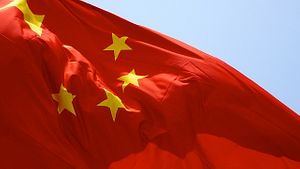Beijing is in overdrive to respond to the news that Australia will build nuclear-powered submarines, thanks to technology being shared by the United States and the United Kingdom. No event since China’s 2016 loss to the Philippines in an international arbitration case over disputed waters in the South China Sea has evoked such a howl from Chinese officialdom.
Designated AUKUS, the security pact between Australia, the U.K., and the U.S. delivers Australia an exponentially more powerful submarine force than its originally planned purchase of conventional submarines from France. Frances’s own reaction to losing the contract with Australia, although biting, is nonetheless mild in comparison to China’s rhetoric.
Initially, China’s response was characterized by statements calling AUKUS “extremely irresponsible.” A Chinese Foreign Ministry spokesperson said that the pact “seriously undermines regional peace and intensifies the arms race.” The reaction was, diplomatically speaking, strong but measured.
But the language from China’s official news outlets devolved into insults, threats, contempt, and disparagement.
Accusing the United States of “hysterically polarizing its alliance system,” the Global Times, an international English-language media outlet owned by the Chinese Communist Party, said on its editorial page that “Washington is losing its mind by trying to rally its allies against China.”
The paper went on to say that Australia “is still a running dog of the US,” and is a participant in the “US-led strategic siege of China.”
“If Australia dares to provoke China more blatantly because of that, or even find fault militarily, China will certainly punish it with no mercy,” the paper warned.
In a classic case of ironic blindness, the editorial suggested that Australia “should remain self-aware.”
If Australia becomes “militarily assertive,” the paper warns, “Australian troops are also most likely to be the first batch of Western soldiers to waste their lives in the South China Sea.”
Of course, the threats were not reserved for Australia alone. “The US intends to turn the Quad and AUKUS into ‘sinister gangs’ containing China,” a separate Global Times editorial said. It went on to “warn solemnly Japan, India and Australia not to follow the US too far in confronting China. Once they step on the red line of China’s core interests, China will not care about their relations with the US, and China will not hesitate to punish them.”
The Quad is a strategic dialogue among Australia, India, Japan, and the United States, initiated in 2007 by then Japanese Prime Minister Abe Shinzo. Suspended for a decade after Australia ceased its participation, the alliance was revived in 2017. The leaders of all four nations met at the White House in Washington, D.C. in March of this year, where they pledged to “commit to promoting a free, open rules-based order, rooted in international law to advance security and prosperity and counter threats to both in the Indo-Pacific and beyond.”
More prosaically, the China Daily characterized the current U.S. White House leadership as a copy of Donald Trump’s: “The Biden administration, for all its claims to be different from its predecessor, seems to have copied one unpleasant mannerism at least and that is how to behave in the region like a street gang boss, amplifying differences and stoking confrontation in a bid to start turf wars.”
It seems not to have occurred to China to consider that if it can’t find common ground with either U.S. administration – the two of which could not be farther apart, politically as well as practically – then perhaps the problem is not with the United States.
There is one point that Chinese media and officialdom does get right, however. The Western democracies and many of China’s neighbors do want to contain China as it exists today, although few will say it. Specifically, they want to contain the Chinese Communist Party. Much of the world is aghast at China’s treatment of minorities such as Uyghurs and Tibetans, credible evidence of forced organ harvesting, technology and IP theft, and the CCP’s increasing obsession with state control over the daily lives of individuals.
Most topically, China’s refusal to cooperate openly and professionally with a scientific investigation into the origins of the COVID-19 pandemic will remain an open sore for decades to come in the minds and hearts of many around the world, particularly among those who have lost loved ones to the disease.
If nations like Australia and the United Kingdom, which were proudly flaunting their strong ties with China just a few years ago, are now seeking to “contain” China, it’s because of Beijing’s own actions.
But there is little stomach to acknowledge this in Beijing. On the contrary, China’s foreign policy seems to be based not so much on the relatively recent concept of wolf warrior diplomacy as on a bunker mentality, defined as “a state of mind, especially among members of a group, that is characterized by chauvinistic defensiveness and self-righteous intolerance of criticism.”
Today, China’s reaction to its problems with foreign relationships is a far cry from a previous tactic familiar to all China watchers. For decades, anytime China felt itself besieged and beleaguered by a foreign nation, it would state that the offending party was “hurting the feelings of the Chinese people.” Understandably, this phrase provoked nothing but amusement within the foreign community. Whether Chinese officials finally realized this, or whether they simply saw that the phrase was wholly ineffective in influencing foreign behavior, is unclear. But it might be worth a try to revisit the concept. It is certainly better than hurling insults and making open threats.
































